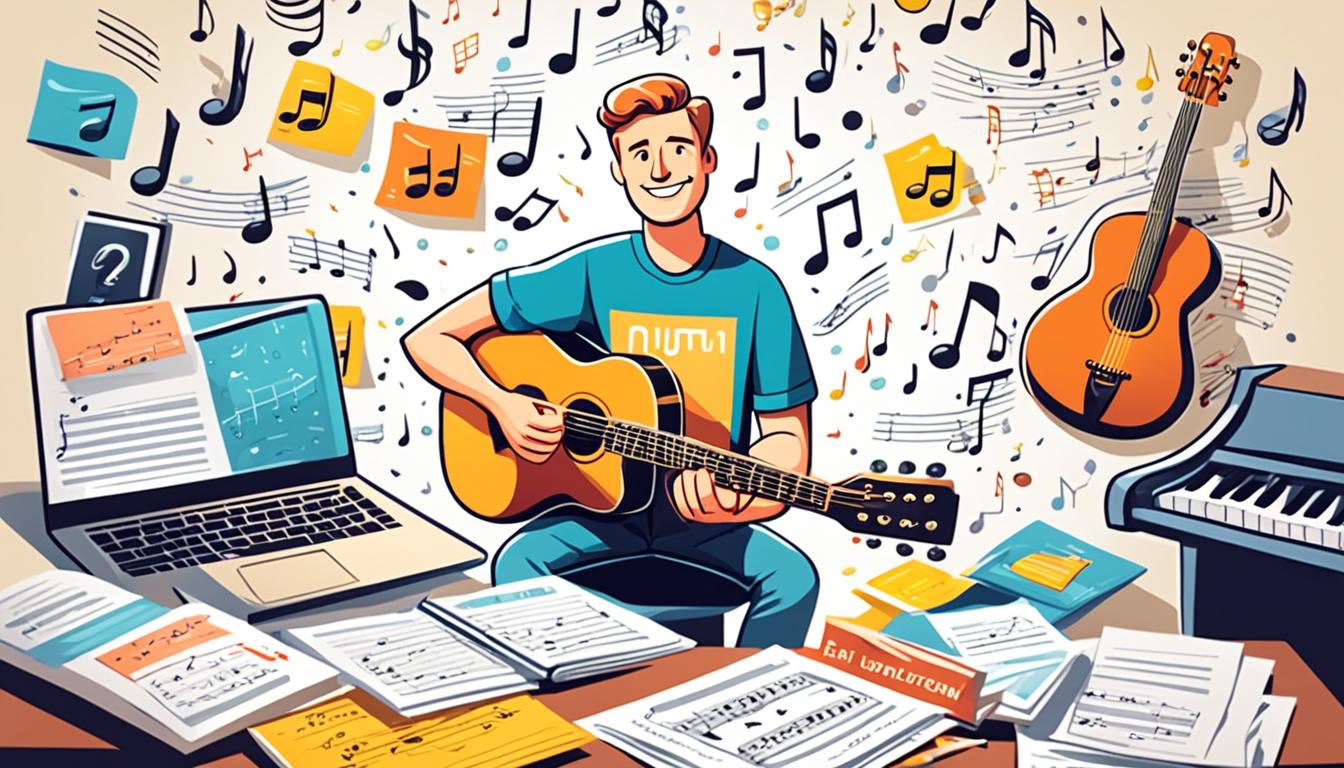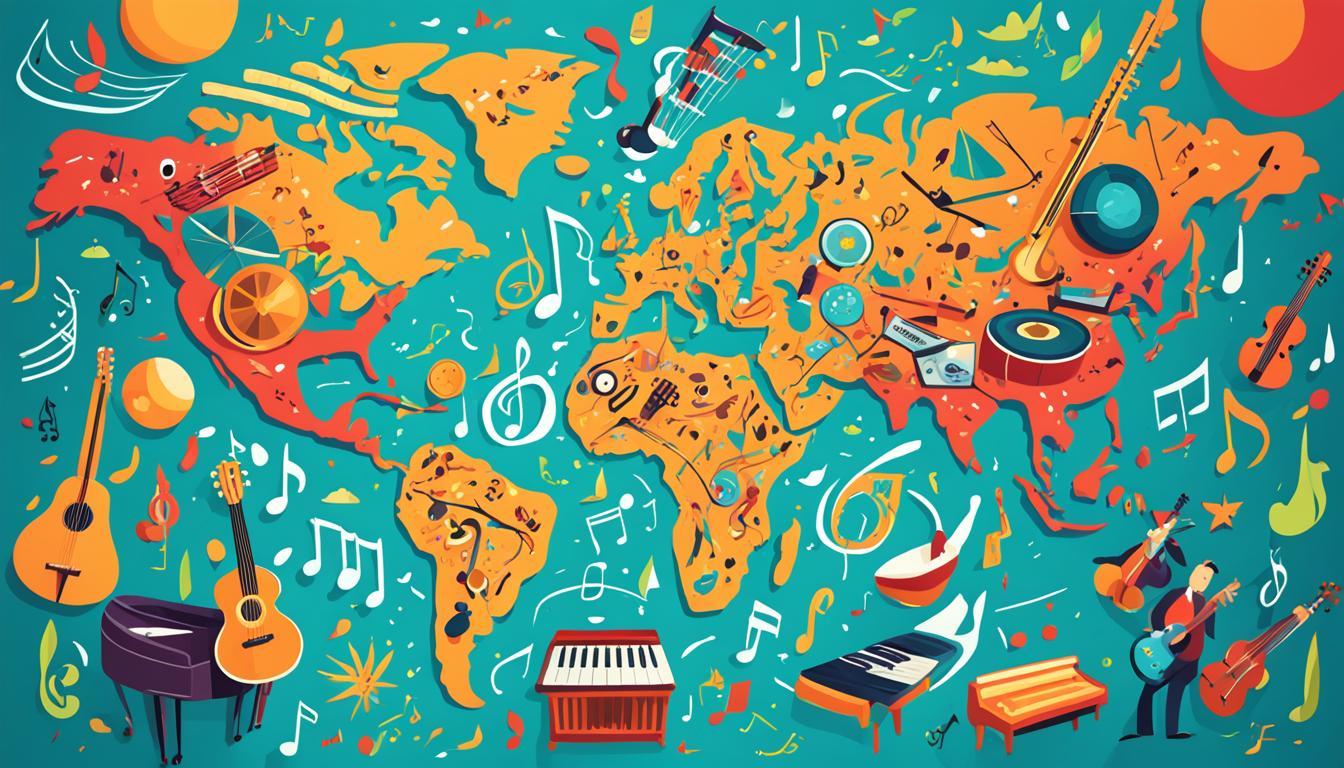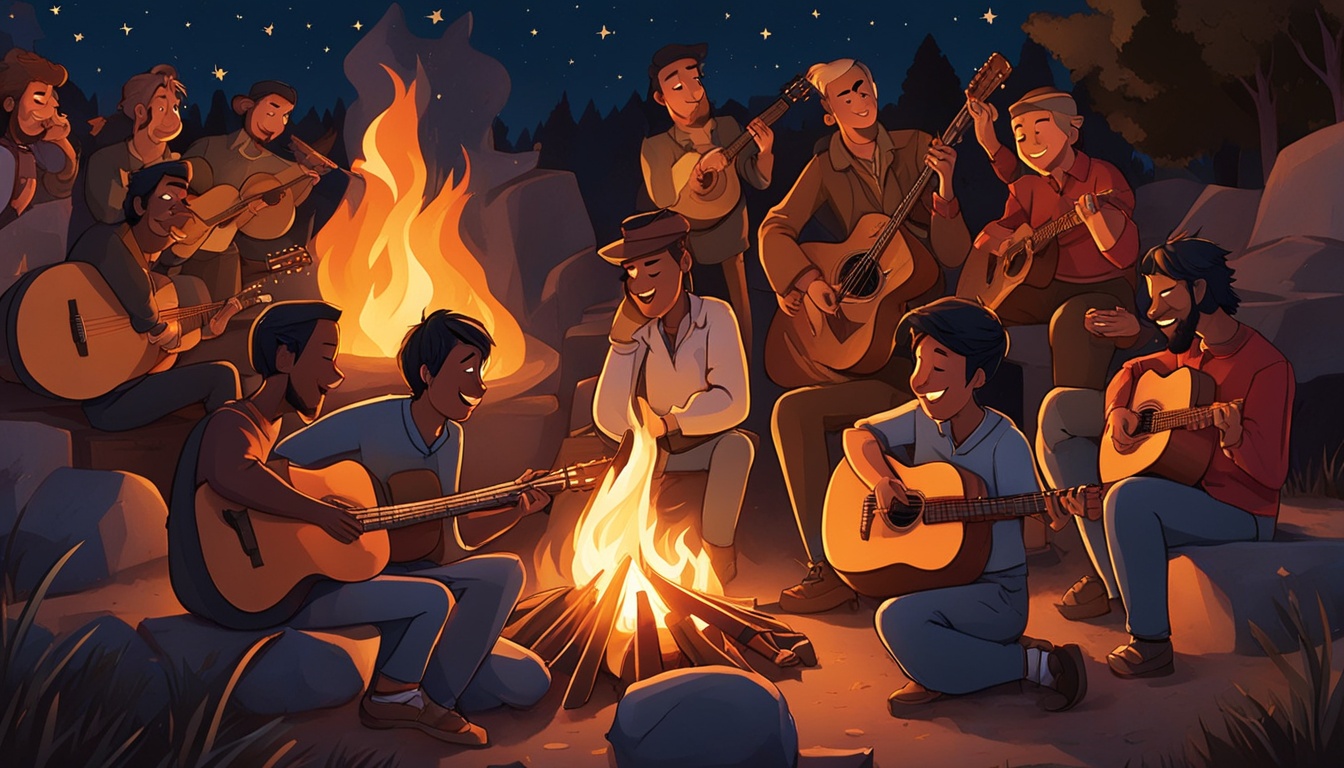Picture yourself on a stage with the crowd cheering loudly. They applaud as you share your music with heart. It’s a bright, energy-filled moment. This is what many musicians dream of. To get ready for a music career, you need hard work, planning, and to know the industry well.
Now, musicians can get famous without big record labels, thanks to the internet. They use sites like SoundCloud, YouTube, and Instagram to share their songs. This way, new artists can find fans all over the globe.
Success starts with setting goals. Know what you aim for, then plan your steps. You might want to write a song or play live gigs. Later, you could earn from your music in different ways. Remember, success also means growing and feeling fulfilled, not just being famous.
It’s crucial to create a unique artist brand to stand out. Think about your look, music style, and the message you send. Staying true to yourself is important. Events like the Berklee Career Jam offer great chances to meet industry experts and learn.
Internships are key for learning and impressing future bosses. The Berklee Career Center’s Internship Expo is a chance to meet many companies. It’s a great way to explore the music industry and make important contacts.
Starting your music career can happen at any age. Some stars, like Justin Bieber and Billie Eilish, began young and made it big. Young artists add fresh sounds but face challenges like pressure and missing out on normal teen life.
But age doesn’t stop you from starting in music. Look at Susan Boyle and Leonard Cohen, who showed that experiences bring richness to music. Don’t let the focus on youth stop you. It’s about your passion and talent, not how old you are.
Work on your music skills and be open to learning. Musicians need to be good at improvising and managing projects. Playing covers is a good way to improve and understand songwriting better.
Deciding between a solo career and forming a band depends on many things. Think about what matches your artistic goals. Going solo means full control but more work. Signing with a label offers support but might limit your creative freedom.
Having clear goals keeps musicians on track. Devote time to perfecting your craft and performing well. Succeeding in music means adapting and trying new things. Stay open to working with others, attending events, and finding new fans.
Key Takeaways:
- Set clear goals and create a roadmap to achieve them1.
- Build a strong brand and connect with your audience1.
- Attend networking events like the Berklee Career Jam1.
- Gain experience through internships1.
- Practice and improve your skills12.
- Consider the pros and cons of being a solo artist or starting a band2.
- Set specific short-term and long-term goals2.
Defining Your Goals and Success in the Music Industry.
Setting clear and measurable goals is key for any artist in the music scene. This creates a path that guides your career and tracks your growth. Want to be a famous singer, songwriter, or producer? Defining your aims helps focus your energy on reaching them.
Success in the music world can seem complicated and varies person to person. It’s not just about selling songs and concert tickets. True success combines artistic joy, connecting with fans, being featured on playlists, and growing your listener base.
The music world is vast, with success meaning different things to each artist. Remember, those at the top, though visible, are just a fraction of the industry3. Most artists are performers or singer-songwriters. For them, success might be making a living from their music alone3.
To thrive in music, aim for both passive and active income. Don’t rely just on song sales or ticket sales for money3. Many musicians teach or do session work on the side. This way, they keep making music while earning a steady income4.
Understanding the music business realistically is crucial when setting goals. Success doesn’t happen overnight. For some, it may come fast, but for others, it takes longer4. Remember Thomas Edison’s words: “I have never failed. I have just discovered 10,000 ways that don’t work”5. Keep pushing, focus on your aims, and enjoy the journey in this changing music industry.
Building Your Brand as an Artist.
Creating a strong personal brand is key for artists in the music scene6. It involves your unique style, image, and the music you create, making you stand out6. By crafting a visual identity with things like logos, you make a lasting impression on fans7.
A strong brand isn’t just about how things look. It’s about being active online and connecting with fans6. Using social media helps you reach your fans and build a community around your music6. Putting out new songs, videos, and updates keeps your fans coming back for more6.
Working with other musicians can help spread your music to more people6. Teaming up with artists who have a similar style can bring their fans to you6. Also, amazing live shows can turn existing fans into your promoters and bring in new fans6.
Telling your personal story connects you with fans deeply6. When fans know your journey and what inspires you, they feel closer to you and enjoy your music more6.
Being true to what you stand for is important7. Research shows that fans bond tighter when your values match theirs7. Interacting with comments and hosting events makes your fans more loyal7.
It’s also key to use tools that help you see how well your brand is doing7. Professional-looking logos and album covers attract more attention and engagement7. Using these consistently on social media and merchandise makes your brand well-known7.
To get better at building your brand, consider a course on it8. “Building Your Career in Music: Developing A Brand and Funding Your Music” from Coursera and Berklee College of Music is great for this8. Many students have joined and give it high ratings, covering important topics over six modules8. Instructor Leah Waldo, rated highly by students, will guide you through the branding process8.
Course Details:
| Number of Learners | Average Rating | Level | Duration | Modules | Instructor Rating |
|---|---|---|---|---|---|
| 17,767 | 4.4 out of 5 | Beginner | Approximately 8 hours | 6 | 4.4 |
Statistics show how vital your brand is as an artist67. From engaging online to sharing your art and collaborating, every bit helps you thrive67. The “Building Your Career in Music: Developing A Brand and Funding Your Music” course can really boost your skills in this field8.
Creating and Promoting Your Music.
Once you have honed your musical skills and established your brand, it’s time to let your creativity flow and introduce your music to the world. This part will walk you through creating, recording, producing, and promoting your music effectively.
Creating music is the core of your artistic journey. It doesn’t matter if you write songs, compose, or play instruments, spending time to craft inspiring music is key. It’s essential to embed your individual style and personality into your pieces to truly make them shine.
Recording your music with professional quality is vital. You can either find a good recording studio or set up a home studio with excellent equipment. Doing so captures your music’s true spirit and brings your artistic vision to fruition.
After recording, get into the production phase. Use mixing and mastering to improve your music with balanced sounds and polish. Working with professional producers or using online mastering services can lead to a high-quality final product.
With your music ready, focus next on promotion. Digital distribution on platforms like Spotify, Apple Music, and Amazon Music is crucial for reaching listeners everywhere. These platforms are perfect for independent artists who wish to share their music globally.
In recent years, online music streaming services have transformed how we find and listen to music. A smart promotion plan for these platforms is essential for all artists9.
Promoting your music through live shows is also effective for engagement. Playing live, from small acoustic sessions to big festivals, showcases your talent and connects you directly with fans.
Leverage social media to build your online presence and interact with your audience. Use Facebook, Instagram, Twitter, Snapchat, TikTok, and YouTube for affordable music promotion. Share your journey, talk with fans, and build excitement for your work.
Social media is a cost-effective way to get your music out there10.
Seeking coverage from music blogs and review sites helps gain music exposure. Good reviews and articles can attract new listeners and open up new opportunities and partnerships.
Working with other artists, whether they’re big names or indie, helps widen your reach. Collaborating merges different talents and styles, resulting in music that appeals to more people.
Success in music combines talent, determination, patience, and smart planning. Use advice from music pros to guide your decisions on creating, recording, producing, and promoting your music.
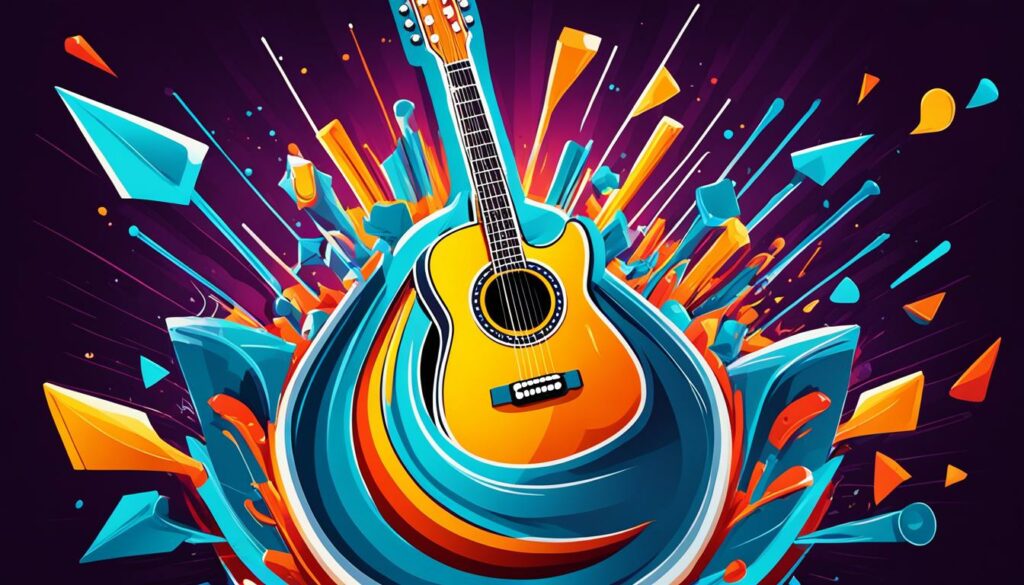
Put your heart into creating and promoting your music, keeping true to your art while also staying relevant. With hard work, dedication, and a bit of luck, you’re on your way to making a mark in the music world.
Networking and Collaborating in the Music Industry.
Networking is crucial for a successful music career. It helps artists make important connections and find opportunities like gigs and deals11. This can lead to collaborations and record deals.
Local music scenes are important for making connections. They offer chances for gigs and meeting other musicians. This can help artists grow and get more exposure11.
Social media platforms, like Instagram and Twitter, are great for networking. Artists can meet booking agents and managers worldwide. This helps them expand their reach11.
Going to music events and workshops is also smart. These events are great for meeting and learning from industry leaders. Musicians can meet producers and engineers, which is good for collaboration11.
Online communities such as Reddit and Facebook groups are good for networking too. Artists can meet people with similar interests and support each other. This creates a community feeling11.
Networking is super important in the music world. It can lead to DJ gigs and band signings through word-of-mouth. A strong network is key12.
Being active on social media is crucial. Most industry pros use social media. A strong online presence can get you noticed and open up new opportunities12.
Attending industry events is vital. Meeting people in person at these events can help you build a good reputation. Personal interactions are valuable for making solid connections1112.
Volunteering for music organizations is a smart move. It helps artists learn about the industry and meet professionals. Getting involved is good for networking12.
Finding a mentor can really help new artists. A mentor can offer advice and introduce you to their contacts. This can speed up your career and help you overcome challenges12.
Networking in music has its ups and downs. It takes effort and time to make meaningful relationships. Being confident and genuine at networking events is very important12.
Networking and working together are keys to a successful music career. They give you access to resources, opportunities, and support. Actively networking and building relationships can set you up for success131112.
Understanding the Business Side of the Music Industry.
To make it in music, understanding the business side is key. This know-how protects your music, maximizes earnings, and helps you adapt to changes. It’s all about turning your music into a successful career.
Copyright Law and Intellectual Property
Copyright law is essential in music, protecting your songs and recordings14. It gives you the right to decide how your music is used and shared. By understanding copyright, you can make money from your music and stop others from using it without permission.
Music Publishing and Monetization
Music publishing is crucial for earning money from your music. Music publishers handle licensing and collecting royalties for your songs15. They find ways for your music to be in TV, movies, ads, and more. Working with a publisher makes handling complex deals easier and ensures you get paid fairly.
Diversifying Revenue Streams
Diversifying your income is key to lasting success in music. Your earnings can come from sales, streams, live shows, merchandise, licensing, and crowdfunding16. By exploring different income sources, you increase your earnings. Knowing what’s fair in the industry helps you negotiate better deals.
Technology has changed the music industry, offering tools for distribution, royalty tracking, and business management16. Digital platforms let artists reach fans worldwide and ensure they’re paid fairly. Services like Spotify and Apple Music are great for connecting with fans and boosting income.
Staying Informed and Adapting
The music industry changes constantly. Being in the know about trends and tech shifts is vital16. This way, you can spot new opportunities and keep your music fresh. Networking with industry pros and attending music events are great ways to stay ahead.
Career Opportunities in the Music Industry
There are many careers in music beyond performing. Over 70 careers are linked to music degrees, offering a variety of paths14. Managers, agents, promoters, and music lawyers are just some roles that make the industry tick. Knowledge of these roles can lead to a successful music career.

| Statistical Data | Source |
|---|---|
| The music industry has evolved significantly due to technological advancements, new market players, and increased competition. | Link 1 |
| Approximately 70+ different careers related to music degrees and the related salaries are revealed to guide individuals in understanding the range of opportunities within the music industry. | Link 3 |
| The global Live Music Industry is projected to be worth $31 billion in 2022. | Link 2 |
Getting Your Music on the Radio, TV, and Online.
Having your music play on the radio and in TV shows puts you on the map. It helps your songs reach people and get noticed in the music world. Online features let you meet fans directly and create a group of loyal listeners.
Start by exploring radio stations that help independent artists17. Look for ones that match your music style and audience. Making connections with DJs and music leaders can boost your chance to be heard. Try out local talent shows or online music contests to get your music out there. Keep trying and make connections in this tight competition18.
For TV and getting noticed online, team up with music publishers and publicists1719. They can introduce you to industry folks and online spots. They help with licenses and make sure you get paid for public plays of your music1719.
Today, being online is a big deal for artists. You can use platforms like Twitch and YouTube to hold concerts live. This lets you talk to fans and show your music. Use the chance to meet fans, answer questions, and let them peek into your music life. To really shine online, stay active on social media and keep sharing new songs. This builds a crowd that supports you1719.
Focus on getting on the radio, TV, and online spots to spread your music far. Building relationships, keeping up with trends, and promoting your music non-stop are important. Work hard on your music, look for new ways to share it, and stay active. This boosts your chance to have your music heard and loved18.
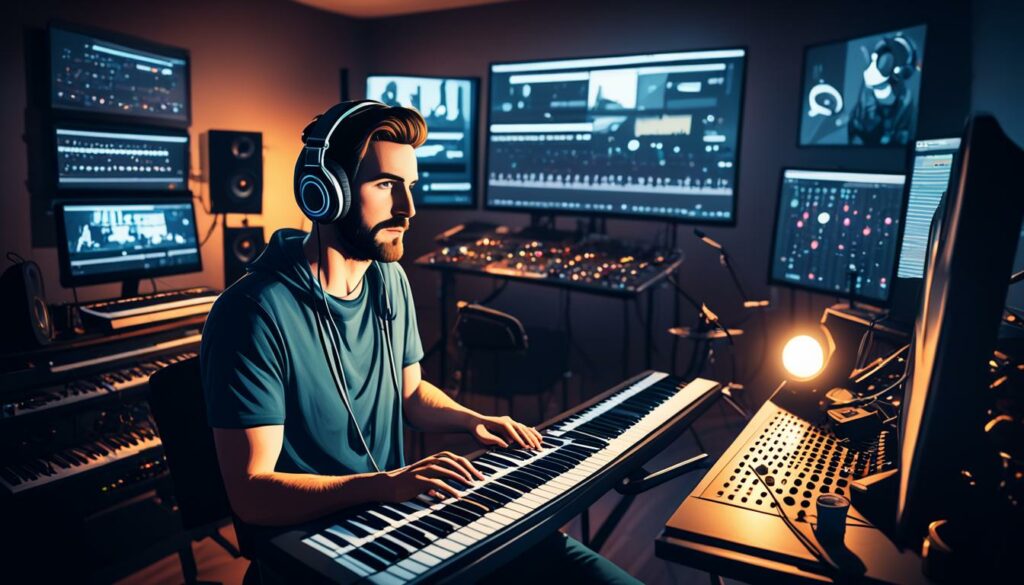
| Benefits of Getting Your Music on Radio, TV, and Online |
|---|
| 1. Increased exposure to a wider audience |
| 2. Opportunities for recognition and career advancement |
| 3. Building relationships with industry professionals |
| 4. Fan engagement through livestreaming and online platforms |
| 5. Potential for increased music publicity and media coverage |
Gaining Publicity and Media Exposure.
For musicians, getting noticed and attracting new fans is key to success. This involves making plans, building media connections, and using different promotional methods.
Getting media attention might mean hiring a publicist. They have media contacts and can get your music featured. Working with a music publicist has been shown to grow your fan base and get your brand noticed20.
It’s important to know the audience of media outlets to match your music with them. This approach increases the chance your music will hit the right chord with them. Good relationships with journalists who love your style can lead to great exposure20.
Even without a press agent, you can still reach out to the media. Send your music to outlets that fit your sound and keep in touch. Connecting directly with journalists and bloggers who like your music can spread the word to the right audience20.
Being active online helps too. Social media is a strong way to promote yourself and talk to fans. Platforms like Instagram, TikTok, and LinkedIn work well for musicians. Regularly posting engaging content and talking to fans helps you build a follow base that catches media attention21.
Visuals and multimedia are crucial on social media. Using YouTube and Snapchat lets you connect through videos and live streams. Offering special rewards for fan involvement can spark interest and buzz around your releases21.
Having a unique brand also brings publicity. According to experts, a distinct brand draws media attention and sets you apart from the competition20. It’s key to express your unique qualities through your music, look, and story.
Tracking your publicity success helps tweak your approach. Watching your website hits, social media activity, and stream counts gives insight. This data helps you fine-tune your strategy for better exposure.
To sum up, effective publicity for musicians means being proactive, planning well, and knowing your audience. Through media connections, a strong online presence, and a standout brand, you can grab media interest, reach new fans, and find success in the music scene.
Finding the Right Management.
Finding the right manager is crucial for your music career. This could be a professional team or someone you trust. They must get your music, have the needed experience, and connections. Good communication is important in this relationship. It helps make sure everyone is aiming for the same goals. Managers help direct, provide opportunities, and support as you move through the music industry.
The Role of Musicabilité Managers
Music managers are key in helping artists move forward. The Music Managers Forum (MMF)22 says artists should think about getting a manager when admin tasks take up all their time. The MMF suggests considering management when you’ve done all you can by yourself. Knowing what you bring to the table is also important. It shows how dedicated you are22.
It’s suggested to look for managers who work in your music genre for the best match22. Experts like Loretta Andrews from Safe Music Management say the best managers truly believe in their artists22. Before signing anything, take your time to pick the right manager. Discuss their role, duties, strategy, and working terms carefully22.
Skills and Networking in Artist Management
Being an artist manager means having key skills, knowledge, and connections23. Knowing the music industry well is crucial for success23. It’s important to build a network by going to events and meeting artists23. This network can give you industry tips, referrals, collaboration chances, and more visibility23. Working with up-and-coming artists can also boost your reputation23.
Sharpening your skills and staying updated with the industry are musts23. Social media is important for artists and their managers23. Creating a solid online presence can help establish your brand as a manager23.
The Role and Path of Music Managers
Music managers can be new or very experienced, sometimes coming from other industries24. They have many roles like getting to know the industry, making business choices, and handling social media24. A good manager knows strategy, finance, law, marketing, and negotiation24.
There isn’t just one way to become a music manager. It usually involves discovering a talented artist, gaining experience, and building a network24. Yet, there’s a shortage of skilled music managers24. Big companies might hire for administrative roles to help with managing tasks24.
When looking for the right manager, think about your goals. Choose someone who believes in you and communicates well. A manager is a great help in moving your music career forward. They offer advice, opportunities, and support.

Conclusion.
Preparing for a music career takes a lot of dedication and knowing the music world well. You need to set clear goals and follow valuable advice. This way, your chance of making it in the competitive music scene goes up25. The Musicians Institute (MI) gives you a broad curriculum that touches on many music styles. It arms aspiring musicians with various skills and knowledge25.
MI’s Bass Program lets students work with top-notch gear and facilities. This helps them try out different equipment and find what they like best25.
Getting hands-on experience is key to doing well in the music world. MI knows this and offers internships at big music companies. Here, students get real-world experience and even earn course credits25. The teachers at MI, who are pros in the industry, offer great connections. They help students find internships, collaborations, and sometimes jobs25.
It’s important to know that building your brand, making and sharing your music, building a network, and knowing the business are all essential. Also, never stop learning and getting better to keep up with the music scene25. Singers especially need to practice a lot. They have to work on their voice, how they breathe, and how they stand. This keeps their vocal cords healthy2627.
Success in music might not happen right away. But if you keep at it, great things can happen27. Now, with social media like TikTok and Instagram, singers have more ways to get noticed27. Making connections and teaming up with others is super important. It can open doors to tours around the world, big-time collaborations, and getting known in the industry27.
FAQ
How important are goals in preparing for a career in the music industry?
How can I measure success in the other industry?
What is the importance of building a strong brand as an artist?
How can I create and promote my music effectively?
Why is networking important in the music industry?
What do I need to understand about the business side of the music industry?
How can I get my music on the radio, TV, and online?
How can I gain publicity and media exposure as a musician?
What should I consider when finding the right management for my music career?
What are some key tips for preparing for a career in music?
Source Links
- https://www.berklee.edu/careers/essentialsofsuccess.html – 5 Essentials of Music Career Success
- https://soundcamps.com/blog/how-to-start-a-music-career/ – How to Start a Music Career in 2024
- https://www.makingascene.org/how-to-define-success-as-a-musician/ – How to Define Success as a Musician
- https://www.careervillage.org/questions/793882/whats-the-first-step-for-starting-a-music-career – What’s the first step for starting a music career?
- https://www.indieonthemove.com/blog/2014/10/defining-success-and-how-to-achieve-it-with-a-career-in-music – Defining Success And How To Achieve It With A Career In Music
- https://www.planetarygroup.com/7-ways-to-build-a-strong-personal-brand-as-a-musician/ – 7 Ways to Build a Strong Personal Brand as a Musician
- https://www.icmp.ac.uk/blog/building-a-brand-a-music-artist-or-band – Building a Brand as a Music Artist or Band
- https://www.coursera.org/learn/navigate-music-industry-independent-artist – Building Your Career in Music: Developing A Brand and Funding Your Music
- https://blog.landr.com/how-to-promote-your-music/ – Music Promotion: How to Promote Your Music in 2024
- https://www.careersinmusic.com/music-marketing/ – Music Marketing 2024: 11 Ways to Get New Fans for Your Music
- https://www.linkedin.com/pulse/power-networking-music-industry-guide-musicians-musicadvice – The Power of Networking in the Music Industry: A Guide for Musicians
- https://pirate.com/en/blog/music-industry-networking/ – How To Start Networking In The Music Industry
- https://www.mi.edu/in-the-know/importance-networking-music-industry/ – The Importance of Networking in the Music Industry | Musicians Institute
- https://www.zenbusiness.com/info/guide-to-music-industry/ – A Guide to Business in the Music Industry | ZenBusiness Inc.
- https://www.careersinmusic.com/music-industry/ – Music Industry: How to Break Into the Music Biz of the 2020s
- https://www.planetarygroup.com/why-understanding-the-business-side-of-the-music-industry-is-key-to-success-as-a-musician/ – Why Understanding the Business Side of the Music Industry is Key to Success as a Musician
- https://dittomusic.com/en/blog/how-to-submit-music-for-tv-and-film – How To Submit Music For TV & Film
- https://www.careersinmusic.com/how-to-get-into-the-music-industry/ – How to Get Into the Music Industry & Create Your “Big Break”
- https://info.xposuremusic.com/article/how-to-submit-your-music-for-film-or-tv – How to Submit Music for Film or TV | Xposure Music
- https://www.iconcollective.edu/music-publicist-advice – Do You Need a Music Publicist? Here is Advice
- https://www.planetarygroup.com/music-promotion-guide/use-social-media-effectively/ – How to Use Social Media Effectively as a Musician
- https://musiciansunion.org.uk/events-career-development/career-development/career-guides/working-relationships/how-to-get-a-music-manager – How To Get A Music Manager | How To Find A Music Manager | MU
- https://www.usemogul.com/post/how-do-i-start-a-career-in-artist-management – How Do I Start A Career In Artist Management?
- https://www.ukmusic.org/job-profiles/music-manager/ – Music Manager
- https://www.mi.edu/in-the-know/studio-road-preparing-career-music-industry-mis-bass-program/ – Prepare for a Career in the Music Industry as a Bass Player | MI
- https://gradesfixer.com/free-essay-examples/music-as-a-life-passion/ – My Passion for Music as a Part of My Life: [Essay Example], 789 words
- https://www.careersinmusic.com/singer/ – How to Become a Singer & Start a Singing Career

